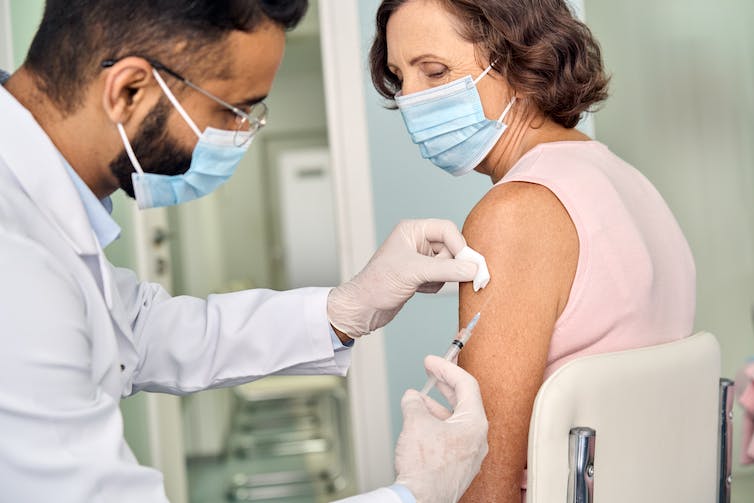
Siberian Art/Shutterstock
More than five billion people globally have now been vaccinated against COVID-19. Of course, many of the three billion or so who haven’t may not yet have been able to access a COVID vaccine, particularly in low-income countries. But a portion of those who are unvaccinated have chosen not to get a shot.
Since COVID vaccines became available two years ago, we’ve seen increasingly wide and often bitter divergence between those who are vaccinated and those who have chosen not to be.
A recent study in Nature sought to investigate the extent of the intolerance and discrimination between people who are vaccinated and people who are unvaccinated against COVID. The researchers found that in most countries, people who are vaccinated display negative attitudes towards people who are not vaccinated. But interestingly, there was minimal evidence for the reverse.
The authors carried out three conjoint studies surveying more than 15,000 people from 21 countries across all inhabited continents. They used surveys designed to measure prejudice expressed in three forms: affective (for example, negative emotions towards a group), cognitive (for example, negative stereotypes) and attitudinal (for example, support for exclusion and removal of rights).
The surveys highlighted that vaccinated people expressed discriminatory attitudes towards unvaccinated people in all countries except Hungary and Romania.
Conversely, antipathy from unvaccinated people towards vaccinated people was only observed in Germany and the US.
In most countries, prejudice towards unvaccinated people was as high or higher than towards social groups who have traditionally been discriminated against, such as immigrants, ex-convicts and drug addicts.
Read more:
Vaccine hesitancy is not new – history tells us we should listen, not condemn
The researchers found that many vaccinated people would not want their close relatives to marry someone who was not vaccinated (an example of affective expression). They also tended to perceive the unvaccinated as incompetent or less intelligent (cognitive expression).
A survey conducted only in the US as part of the wider study found people who are vaccinated believe unvaccinated people should be denied certain fundamental rights. This is an example of attitudinal expression.
For instance, some vaccinated people felt that unvaccinated people should face restrictions to their freedom of movement. A lower proportion advocated for restrictions to freedom of speech, access to US citizenship and welfare benefits.
A free ride?
Interestingly, the extent of discriminatory attitudes towards unvaccinated people was greater in countries with higher social trust and a stronger culture of cooperation. In such countries, people were more likely to agree with the statement “most people can be trusted”, as opposed to countries with lower social trust where the majority felt “you need to be very careful in dealing with people”.
The authors of the study interpret this finding through the lens of the psychology of human cooperation. That is, in countries with a pronounced sense of civic duty and individual responsibility towards the common good, people who benefit from the collective effort without contributing their part are perceived as “free riders”.
In this context the shared effort is of course getting vaccinated, and the collective benefits include a lower risk of infection and therefore illness and death, the end of lockdowns, and so on.
Countries with higher trust and a cooperative culture are typically more effective at suppressing epidemics. So it’s understandable and indeed natural that citizens in these countries in particular would harbour negative feeling towards these so-called free riders, whose choice to refuse vaccinations may endanger their peers and society at large.

Ground Picture/Shutterstock
Although this study found greater evidence that vaccinated people discriminate against those who aren’t vaccinated, rather than the reverse, there are still vocal parts of the unvaccinated population that express hostility towards those who are vaccinated.
For example, some claim biological supremacy over the vaccinated, calling themselves “pure bloods”. The unfounded idea that vaccinated people are biologically inferior has gained increasing popularity among hardline vaccine sceptics and conspiracy theorists, to the point where some patients refuse transfusions with blood “tainted” by the vaccines.
These are extreme, and, thankfully, relatively rare forms of vaccine hesitancy. But such examples show it’s not just the vaccinated perpetuating negative attitudes.
Towards a polarised society
While social psychology offers an explanation for why vaccinated people may harbour resentment towards unvaccinated people, it’s important to remember that blanket discrimination directed at any social group is detrimental, not just towards those being discriminated against, but for society at large.
The authors of the study warn that in the short term, prejudice towards the unvaccinated may complicate the management of the pandemic, for example by alienating part of the population and making them even less likely to comply with preventive measures. In the long run, they suggest it may mean societies leave the pandemic more polarised than they entered it.
Read more:
We measured vaccine confidence pre-pandemic and in 2022 – it’s declined considerably
While anti-vaxxers and conspiracy theorists are frequently the ones who attract the most controversy, they’re not the only people who make up the unvaccinated population. For example, a person may refuse or delay vaccination due to medical conditions, mental health issues or needle phobia, or because they’re part of a minority with negative past experience with health authorities.
This study reinforces how important it is for governments and healthcare workers to communicate public health information in a transparent and non-judgemental way. It’s essential to understand the diverse reasons why people might hesitate about vaccinations, and to communicate the importance of preventive measures (for the individual and wider society) without discriminating or antagonising hesitant people or groups.
![]()
Alessandro Siani does not work for, consult, own shares in or receive funding from any company or organisation that would benefit from this article, and has disclosed no relevant affiliations beyond their academic appointment.
























